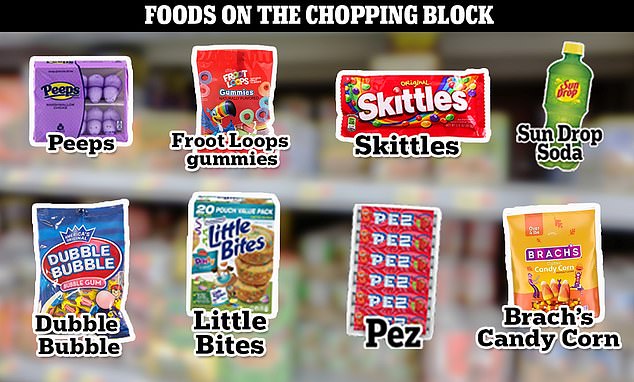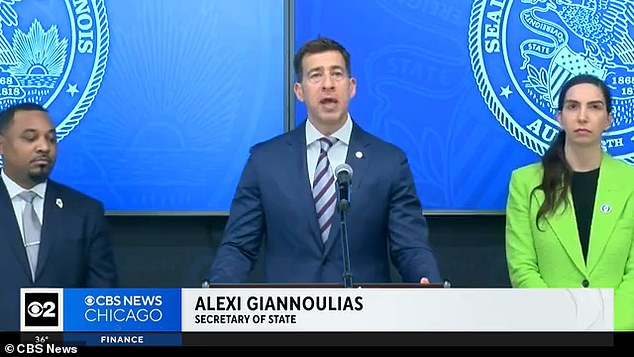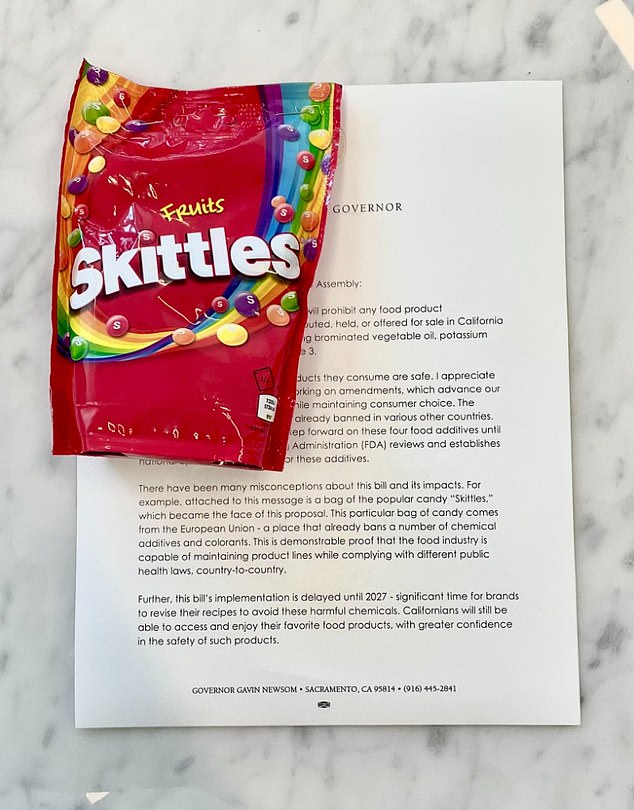Illinois could become the next state to pass the ‘Skittles Ban,’ banning the sale of candies containing cancer-causing chemicals such as Pez, Peeps and Sun Drop
Illinois is set to become the latest state to impose a ‘Skittles ban’ – as the fight against harmful food ingredients gathers pace in the US.
State lawmakers have introduced a bill that would ban five additives linked to cancer, chronic diseases and ADHD, which are common in sweets.
The ingredients – brominated vegetable oil, potassium bromate, propyl paraben, red dye No. 3 and titanium dioxide – are currently used to make Skittles, Pez candies, Peeps and Sun Drop soft drinks, among other products.
The law was proposed by Illinois Secretary of State Alexi Giannoulias, who called for action to stop harmful chemicals being “crammed” down children’s throats.
California is the only state to pass the so-called skittle ban, which will take effect in January 2027, but Pennsylvania and New York have introduced similar bills.
The above map shows the state that has implemented bans on four food additives – brominated vegetable oil, potassium bromate, propyl paraben and red food coloring No. 3 – and the three that are considering bans (yellow). Illinois is also considering banning titanium dioxide, which is found in cones

About 12,000 products sold in California use the banned additives, according to the Environmental Working Group. They must update their prescriptions by January 2027 or be banned in the state
Democrat Giannoulias said at a news conference announcing the bill: “You can’t eat this stuff in Europe. You can’t eat this stuff in Japan.
“But we just shove it down the throats of our children here in the United States of America. And that’s not okay.
‘These additives have all been linked to serious health problems, including hyperactivity, damage to the nervous system, reproductive problems, hormonal damage and an increased risk of cancer.’
He added, “Passage of this bill will result in a healthier and more prosperous Illinois and will ensure our citizens eat safer, healthier food.”
At the conference, he also held up a bag of skittles he had purchased from the European Union that did not contain titanium dioxide.
He said: ‘This particular bag of Skittles… proves that companies are indeed very capable and hopefully willing to maintain product lines while complying with a number of public health laws that vary from country to country.’
The bill – called SB 2637 – must pass three readings in both the Senate and House and in committees in both houses. It will also have to be signed into law by the Democratic Governor J.B. Pritzker.
The process can take more than a year, but if there is strong political will it can be reduced to months.

Illinois Secretary of State Alexi Giannoulias (pictured) announced the proposed law in the state during a press conference

California Governor Gavin Newsom sent a letter confirming he had signed the bill. To this he attached a bag of skittles from the European Union, saying this was proof that companies could change their recipes
In California, it took eight months for the bill to pass the state Senate and House of Representatives and be signed into law by the governor. It had just one change, removing titanium dioxide – found in Skittles – from the banned list.
If passed, the Illinois bill would take effect in January 2027 — the same date as California’s.
The New York and Pennsylvania bills are both currently still in committee.
Experts say the bills could amount to a nationwide ban on the ingredients because, if passed, they would take effect in America’s most populous states — which could require manufacturers to modernize their entire production lines.
America, unlike European countries, has not phased out these ingredients due to a difference in the regulation of food products.
European regulators take action if there is suspicion that an additive may cause a serious health problem, such as cancer.
But in America, regulators will wait until there is a strong body of evidence suggesting the link.
The Food and Drug Administration (FDA) belatedly proposed a ban on brominated vegetable oils last year, saying the scientific evidence was now concrete enough to indicate a health risk. In Europe, this additive was banned in 2008.
Democratic state Rep. Anne Stava-Murray, who sponsored the Illinois bill, said, “I don’t think any of us in this room would want to serve our child a bowl of cereal, which could also cause cancer.
“And yet that happens every day.”
Campaigners have congratulated Illinois on the move, with Consumer Reports – which is leading efforts to phase out the additives – saying it is sending a “clear message” that consumers will no longer tolerate these additives in their food.
The organization’s food policy director, Brian Ronholm, told DailyMail.com: ‘It’s great that Illinois lawmakers are recognizing the need to ban these chemicals, especially when safer alternatives are readily available and already in use.
“It continues to send a clear message that consumers will no longer tolerate harmful chemicals with unpronounceable names in their food.”
Food health expert Julie Chapon called the news “great news” and said it was a “positive step toward cultivating a food culture that values safety and evidence-backed science over corporate interests.”
Studies show that Red No.3 – a food coloring found in many sweets – was linked to cancer in laboratory animals when exposed to very high doses, and linked to behavioral problems in children.
The US banned it from cosmetic products in the 1990s, but it is still in many food products still sold in the US.
A 2016 study found that it was in more than one in 10 candies in the US and that more than 80 percent of children under the age of two had consumed it in the past two weeks.
Another soon-to-be-banned substance – brominated vegetable oil, made from plants and used for citrus flavors – is suggested to harm the body’s nervous system after long-term exposure.
It has also been linked to chronic headaches, memory loss and imbalance. It was previously in the soft drink Mountain Dew until parent company Pepsi removed the ingredient in 2020.
Propylparaben, often used as a preservative in baked goods, has been linked to fertility problems in mice by disrupting estrogen in women and reducing sperm count in men.
Potassium bromate is found in many baked goods and processed foods to help dough rise, but has been linked to the development of thyroid and kidney cancer.
Titanium dioxide, which was excluded from California’s ban, has also been linked to a number of health problems after researchers suggested it could build up in the body and damage DNA, increasing the risk of cancer.
Used to whiten foods, a May 2021 review by European regulators found they could not confirm that any level of the additive was safe to consume.
The National Confectioners Association has hit back at the move, saying it risks replacing uniform food safety with a “patchwork” of regulations.
A spokesperson said: ‘This bill would replace a uniform national food safety system with a patchwork of inconsistent state requirements created by legislative fiat that will increase food costs, undermine consumer confidence and create confusion around food safety.
“We must rely on the FDA’s scientific accuracy when it comes to evaluating the safety of food ingredients and additives.”
